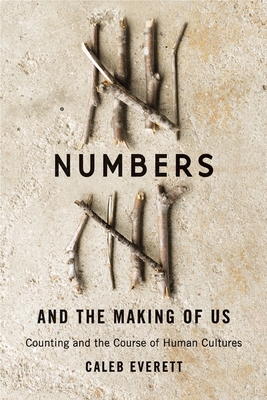
Counting or making my mark
These thoughts follow from reading Caleb Everett’s 2017 book Numbers and the making of us : counting and the course of human cultures.

It argues our ability to use numbers, however useful, is a happenstance affair. A use that composes our body’s limbs & digits with some need in environments varied and varying. Counting does not depend on any innate human quality to number about, it is an outcome of an ability to judge and tell, to mark and score, and if the words one, two and many will do, then they will do so… —for the longest time. This is why, perhaps, inventing zero took a very long time, nearly as long as the infinite, for practically nothing comes of nothing.
[numbers] ‘were the single most influential tools in the linguistic toolkit” […] ‘without these practical cognitive tools, there would likely have been no agricultural revolution and certainly no industrial revolution.’
Of course once counting began in earnest, we use it to change the environment. Agriculture is one co-founding outcome, and that produces an economy, a place that ends up fixated on numbers as measures of our worth.
"What’s it worth?”
"It’s worth the land between two rivers.”
”Let’s call it Mesopotamia.”
The reading of this book influenced the revision found in Slash-and-blur worldculture Part 1 and Part 2 , particularly on the simplest mark of the slash “/”, and those are follows ups to Cormac Orthography, more or less.
Notes on the etymology of “to count”
The connection between marks lies in the roots of our language and tool use, the linguistic taphonomy discussed below, covers only what remains of the evidence, I would say, "where to judge where to make a mark, is the mark of the human".
We begin with the notice of the Latin usage of terms based on com- have meanings related to English prepositions: "with" "together" "alongside":
①ⓐ Latin computare "to count, sum up, reckon together," from:
- com "with, together", and;
- putare "to reckon,"
- originally "to prune," from PIE root *pau- (2) "to cut, strike, stamp."
Modern French differentiates compter "to count" and conter "to tell," but they are cognates.
②The word for a nobile feudal rank of count came into English from the French comte, itself from Latin comes—in its accusative form comitem. It meant "companion" or "attendant", and as a title it indicated that someone close to the ruler was delegated to represent the ruler in some area. In actual lands, especially near disputed borders, or perhaps palace responsibilities — keep your friends close and your enemies closer.

The complex of thought here moves right back to the original strike or score one decides to make, mark and cut, judged as worthy, and then used, in iterative moments, to reckon an account among those I trust…
I say "I" because counting has a point-of-view.
—and perhaps delegate out to represent me over those districts in dispute, those marches where I will make my mark. Because I'm worth it.
But if you are just another number, you pleb, you may not be counted among the worthy -- all things tend towards a commodity once the counting gets beyond us. The close becomes overly familiar and contempt looms above us, and where we desperately seek a premium version to recount the experience of being as special as a child.

Caleb Everett. Numbers and the making of us : counting and the course of human cultures 9780674504431 Harvard 2017 Cambridge Massachusetts
